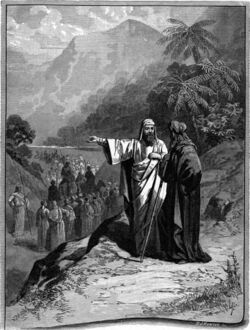Religion:Abraham and Lot's conflict
Abraham and Lot's conflict (Hebrew: מריבת רועי אברהם ורועי לוט, Merivat Roey Avraham Ve'Roey Lot) is an event in the Book of Genesis, in the weekly Torah portion, Lech-Lecha, that depicts the separation of Abraham and Lot, as a result of a fight among their shepherds. The dispute ends in a peaceful way, in which Abraham concedes a part of the Promised Land, which belongs to him, in order to resolve the conflict peacefully.
Biblical narrative
In Genesis 13:5-13, Abraham (then called Abram) and Lot separate, as a result of the quarrel among the shepherds. At the beginning of the story, Lot is described as a very wealthy man, like Abraham is after his return from Egypt. The biblical text does not elaborate on the exact reason for the dispute, however, as a result of this, Abraham offers Lot to separate, in order to prevent the fight, and he grants Lot with the right to be the first among the two to pick the territory he desires:
5 And also Lot, who went with Abram, had flocks and cattle and tents. 6 And the land did not bear them to dwell together, for their possessions were many, and they could not dwell together. 7 And there was a quarrel between the herdsmen of Abram's cattle and between the herdsmen of Lot's cattle, and the Canaanites and the Perizzites were then dwelling in the land. 8 And Abram said to Lot, "Please let there be no quarrel between me and between you and between my herdsmen and between your herdsmen, for we are brethren. 9 Is not all the land before you? Please part from me; if [you go] left, I will go right, and if [you go] right, I will go left. "—Genesis 13:5-9[1]
Robert Alter suggests that Abraham's language is "clear, firm and polite."[2] Lot accepts the peace deal, for the Partition of the Land, and chooses the area of the plain of the Jordan – in the area including Sodom, and the story ends with Abraham and Lot separately settling in different areas of the Land:
10 And Lot raised his eyes, and he saw the entire plain of the Jordan, that it was entirely watered; before the Lord destroyed Sodom and Gomorrah, like the garden of the Lord, like the land of Egypt, as you come to Zoar. 11 And Lot chose for himself the entire plain of the Jordan, and Lot traveled from the east, and they parted from one another. 12 Abram dwelt in the land of Canaan, and Lot dwelt in the cities of the plain, and he pitched his tents toward Sodom.—Genesis 13:10-12[3]
Outcome
The reference to Sodom in verse 13 suggests that Lot made a bad choice.[4] The narrator uses Lot's choice of land near Sodom as a way of foreshadowing Lot's role in the Battle of Siddim, in which Lot is taken captive in battle, and the role of Lot in the destruction of Sodom and Gomorrah.[5] Lot pitches his tents near Sodom according to Genesis 13:12. By 14:12, Lot is living in the city itself. The destruction of Sodom is related in chapter 19.
The outcome is an example of how Abraham resolved a conflict by trusting the Lord to take care of him, while Lot's decision was based upon what appeared to him to be an attractive, logical choice without considering God's will beforehand.
References
- ↑ Genesis 13:5-9 Chabad Library, classic text, the bible with Rashi, Genesis 13
- ↑ Alter, Robert (1997). Genesis: Translation and Commentary. p. 54.
- ↑ Genesis 13:10-12 Chabad Library, classic text, the bible with Rashi, Genesis 13
- ↑ Alter, Robert (1997). Genesis: Translation and Commentary. p. 56.
- ↑ George W. Coats (1983). Genesis, with an Introduction to Narrative Literature. Wm. B. Eerdmans Publishing. pp. 113–114. ISBN 978-0-8028-1954-3. https://books.google.com/books?id=OrrdUOovklIC&pg=PA113.


